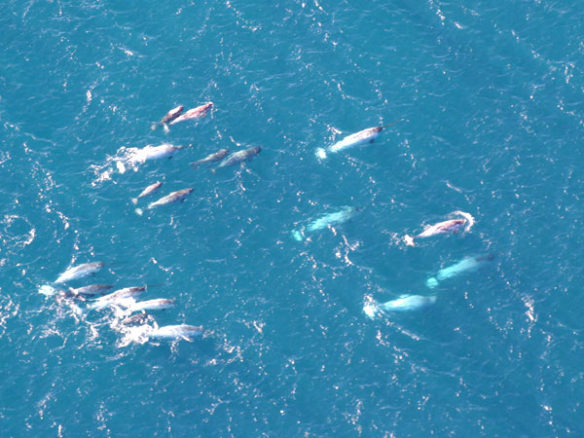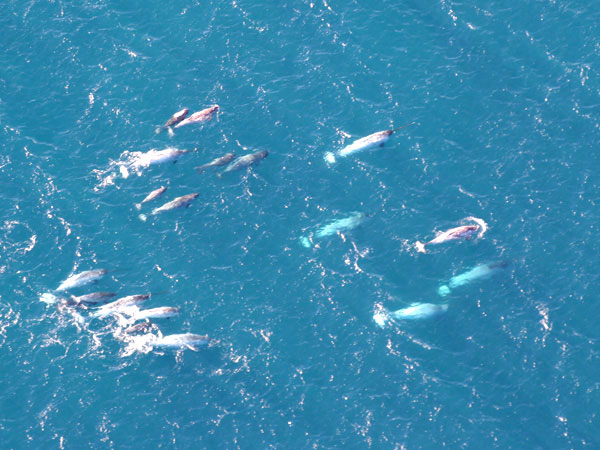
A pod of narwhals from northern Canada. Captions and Photo source: ©© Kristin Laidre / NOAA
Excerpts;
In recent decades parts of the Arctic seas have become increasingly ice-free in late summer and early fall. As sea ice is expected to continue to recede due to climate change, seasonal ship traffic from tourism and freight is projected to rise.
A study from the University of Washington and the University of Alaska Fairbanks is the first to consider potential impacts on the marine mammals that use this region during fall and identify which will be most vulnerable…
Read Full Article; Science Daily (07-02-2018)
Study: Why Blue Whales Can’t Avoid Barges, Ocean Liners, Huffington Green (05-06-2015)
A new study reveals why ocean-going ships pose such a big threat to the whales: the gentle giants simply don’t know how to get out of the way…
World Must Tackle the Biggest Killer of Whales – and it’s not Whaling; IPS News (10-24-2016)
“FREIGHTENED – The Real Price of Shipping,” a movie by multi award-winning filmmaker Denis Delestrac-©-2016; (03-31-2016)
90% of the goods we consume in the West are manufactured in far-off lands and brought to us by ship. The cargo shipping industry is a key player in world economy and forms the basis of our very model of modern civilisation; without it, it would be impossible to fulfil the ever-increasing demands of our societies. Yet the functioning and regulations of this business remain largely obscure to many, and its hidden costs affect us all. Due to their size, freight ships no longer fit in traditional city harbours; they have moved out of the public’s eye, behind barriers and check points…
Super-sized ships: How big can they get? Independent (10-21-2014)
Despite the physical limits and risks, ships of more than 450m are anticipated within the next five years…
Worldwide Ship Traffic Up 300 Percent Since 1992, AGU (11-29-2014)
Maritime traffic on the world’s oceans has increased four-fold over the past 20 years, likely causing more water, air and noise pollution on the open seas, according to a new study quantifying global ship traffic…
Ship engine emissions adversely affect the health of inhabitants of coastal regions; Science Daily (07-19-2016)
Ship emissions adversely affect the health of inhabitants of coastal regions. This was the main finding of a study on the influence of ship engine emissions on macrophages in the lungs. Since macrophages also play a key role in lung diseases such as COPD, the study is important for understanding the health risks of ship exhausts…
Larger marine animals at higher risk of extinction, and humans are to blame, Science Daily (09-14-2016)
In today’s oceans, larger-bodied marine animals are more likely to become extinct than smaller creatures, according to a Stanford-led report. It’s a pattern that is unprecedented in the history of life on Earth, and one that is likely driven by human fishing…









